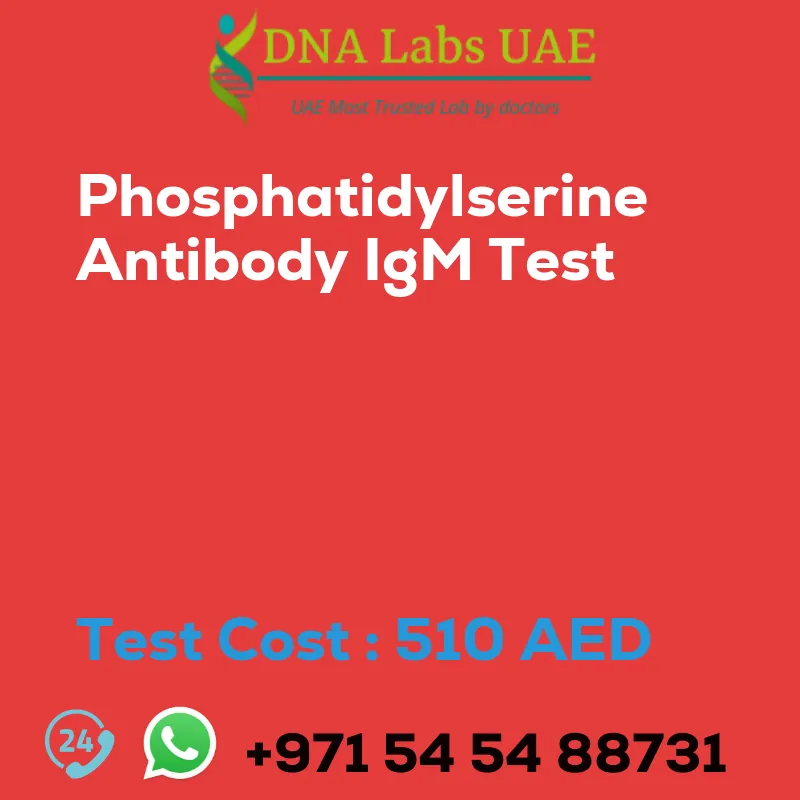PHOSPHATIDYLSERINE ANTIBODY IgM Test
Welcome to DNA Labs UAE, your trusted genetic lab. Today, we will be discussing the PHOSPHATIDYLSERINE ANTIBODY IgM Test and its cost, symptoms, diagnosis, and more.
Test Details
The PHOSPHATIDYLSERINE ANTIBODY IgM test is a laboratory test that measures the levels of IgM antibodies against phosphatidylserine in the blood. Phosphatidylserine is a type of phospholipid that is normally found on the inner surface of cell membranes. However, in certain autoimmune disorders and other conditions, the immune system can produce antibodies against phosphatidylserine, leading to abnormal clotting and increased risk of thrombosis.
Components and Price
The cost of the PHOSPHATIDYLSERINE ANTIBODY IgM Test is AED 510.0. The test requires a sample of 2 mL (1 mL min.) serum from 1 SST, which should be shipped refrigerated or frozen.
Report Delivery
The sample for the test should be submitted by Tuesday at 11 am, and the report will be delivered on Friday.
Method and Test Type
The PHOSPHATIDYLSERINE ANTIBODY IgM test is conducted using the Enzyme Immunoassay method. It is primarily used for the evaluation of thromboembolic disorders and abortions.
Referring Doctor
The PHOSPHATIDYLSERINE ANTIBODY IgM test is usually referred by Gynecologists and Hematologists.
Pre Test Information
No special preparation is required before taking the PHOSPHATIDYLSERINE ANTIBODY IgM test.
Interpretation of Test Results
The results of the PHOSPHATIDYLSERINE ANTIBODY IgM test are usually reported as a numerical value or as positive or negative. A positive result indicates the presence of IgM antibodies against phosphatidylserine, which may suggest an increased risk of abnormal clotting or autoimmune disorders. However, a positive result does not necessarily mean that a person has a specific condition or will develop symptoms. Further testing and evaluation by a healthcare provider are usually needed to confirm a diagnosis. On the other hand, a negative result indicates the absence of detectable IgM antibodies against phosphatidylserine in the blood, which is considered normal.
Conclusion
It is important to discuss the test results with a healthcare provider to understand their implications and determine the appropriate next steps in diagnosis and treatment.
| Test Name | PHOSPHATIDYLSERINE ANTIBODY IgM Test |
|---|---|
| Components | |
| Price | 510.0 AED |
| Sample Condition | 2 mL (1 mL min.) serum from 1 SST. Ship refrigerated or frozen. |
| Report Delivery | Sample Tue by 11 am; Report Fri |
| Method | Enzyme Immunoassay |
| Test type | Thromboembolic disorders, Abortions |
| Doctor | Gynecologist, Hematologist |
| Test Department: | |
| Pre Test Information | No special preparation required |
| Test Details |
The PHOSPHATIDYLSERINE ANTIBODY IgM test is a laboratory test that measures the levels of IgM antibodies against phosphatidylserine in the blood. Phosphatidylserine is a type of phospholipid that is normally found on the inner surface of cell membranes. However, in certain autoimmune disorders and other conditions, the immune system can produce antibodies against phosphatidylserine, leading to abnormal clotting and increased risk of thrombosis. The test is typically ordered as part of an evaluation for autoimmune disorders such as lupus or antiphospholipid syndrome. It may also be ordered if a person has a history of recurrent blood clots or unexplained miscarriages. The test involves taking a blood sample, which is then sent to a laboratory for analysis. The levels of IgM antibodies against phosphatidylserine are measured, and the results are usually reported as a numerical value or as positive or negative. A positive result indicates the presence of IgM antibodies against phosphatidylserine, which may suggest an increased risk of abnormal clotting or autoimmune disorders. However, it is important to note that a positive result does not necessarily mean that a person has a specific condition or will develop symptoms. Further testing and evaluation by a healthcare provider are usually needed to confirm a diagnosis. On the other hand, a negative result indicates the absence of detectable IgM antibodies against phosphatidylserine in the blood, which is considered normal. It is important to discuss the test results with a healthcare provider to understand their implications and determine the appropriate next steps in diagnosis and treatment. |








